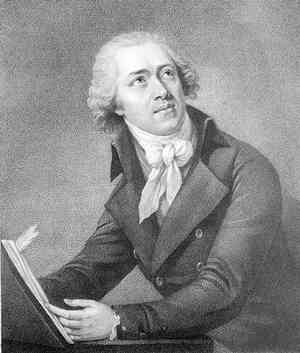


Leopold Koželuch 1797
Engraving: W. Ridley
Source: My Art Prints
Born to a cobbler on 26 June 1747 in Velvary, Bohemia (now Czech Republic), Jan Antonín Koželuh changed his name circa 1773 to Leopold Koželuch to avoid confusion with his cousin, that other composer older by about a decade. Koželuch was better known as a piano virtuoso during his time than as a composer since then. Though he was published and popular throughout Europe, he also caught criticism from fellow composers including Mozart and Beethoven. His legacy consists of about 400 works including some thirty symphonies, 22 piano concertos and 63 piano trios. Though he wrote for both harpsichord and piano, by 1780 the piano was reaching a stage of development such that, like Beethoven, Koželuch could insist upon it, leaving the harpsichord to history.
The Bohemian region nestled largely between Austria, Germany and Poland, and was a Prussian war zone under Frederick II (the Great) who had begun his reign in 1740. Commencing that struggle were the first two Silesian Wars of 1740-45 along with the War of Austrian Succession in 1740-48 and the Seven Years War between 1756 and 1763. Frederick II was himself a musician whose court was held in Prague about 230 miles east as the bird flies from Mannheim in the German region, a key location in the development of classical music upon the phasing out of baroque. Mannheim was a property of Charles III Philip, Elector Palatine, until 1742, then Charles Theodore who later became Elector of Bavaria, briefly before dying, in 1777 to be succeeded by Maximilian I Joseph. Also continuing in juxtaposition was Lutheranism in Germanic Europe versus the Catholicism of the Holy Roman Empire. In addition, Freemasonry, which was formed in the 15th century in England, had by the classical period become of persuasion in political matters. Both Koželuch and Frederick II were Freemasons, though of opposite camps, as Koželuch was an Austrian asset despite studying in Prague. Frederick with his relatively new house on the block called Prussia (1688) was no more fond of any German Elector Palatine the likes of Charles or Theodore than some Austrian Maria Theresa or any number of Polish gravediggers, and allied Prussia with the British. Such the immediate theater of Europe into which Koželuch had been born.
Among Koželuch's teachers in the early seventies was František Dušek in Prague. His first work was a ballet for the National Theater in Prague in 1771 for which he composed for the next twenty-five seasons. (Though this work is everywhere said to have been a great success, its title is nowhere to be found.) In 1778 Koželuch journeyed to Austria where he studied under Johann Albrechtsberger. His Op 1 was 3 sonatas published in 1780 catalogued as P 12:8-10. "P" numbers in Koželuch are from Milan Poštolka's 'Leopold Koželuh: život a dílo' ('life and work') published by Státní hudební vydavatelství in 1964. This thematic directory parceled by categories begins at P 1:1 with a symphony of 1799 in D major titled 'L'Arlecchino'. As can be observed, P numbers don't immediately lend a good indication of chronology.
'Sonata No.1' F major Op 1 P 12:8 Leopold Koželuch 1780
Scored for harpsichord or piano
Piano: Gamma1734
Koželuch established a publishing house called Musikalisches Magazin to print his own works in 1784. He became a Freemason in 1791. In 1792 he not only became court composer and Royal Orchestra Master to Austrian Holy Roman Emperor, Franz II (Francis II), upon the death of Mozart, but was paid twice Mozart's salary.
'Keyboard Concerto' F major Op 12 P 4:1 Leopold Koželuch
Pub 1784 or 1785 in Paris
Slovak Sinfonietta Žilina / Oliver von Dohnány
Piano: Tomas Dratva
'Moisè in Egitto' F major Op 12 P 4:1 Oratorio by Leopold Koželuch 1 Jan 1787
Librettist unknown
Rheinische Kantorei / Das Kleine Konzert / Hermann Max
'Poco adagio' of 'Symphony in C major' Op 24:1 P 1:6:2 Leopold Koželuch 1787
Czech Chamber Philharmonic Orchestra Pardubice / Marek Štilec
'Allegro agitato' of 'Piano Trio in B-flat major' Op 46 P 9:41:3 Leopold Koželuch 1790
Trio 1790
Overture to the opera 'Gustav Vasa' P:23:6 Leopold Koželuch 1792
Helsinki Baroque Orchestra / Aapo Häkkinin
'Sinfonia concertante' E-flat major P 2:1 Leopold Koželuch 1798
Scored for trumpet / piano / mandolin / double bass / orchestra
Academy of St. Martin in the Fields / Consortium Classicum / Iona Brown
Koželuch remained at the Austrian court the rest of his life, but composed very little upon the calendar advancing into the nineteenth century as he concentrated on such as tutoring Archduchess Elizabeth and arranging folk songs for Scottish publisher, George Thomson. He passed onward on 7 May 1818 survived by his daughter, pianist and composer, Catherina Cibbini-Kozeluch.
Sources & References for Leopold Koželuch:
Georg Predota (Interlude)
VF History (notes)
Audio of Koželuch:
Kemp English (keyboard sonatas / piano)
Giedré Lukšaité-Mrázková (keyboard sonatas / harpsichord)
Compositions: Corpora:
Recordings of Koželuch: Catalogs:
All Music DAHR (78 rpm shellac) Discogs Music Brainz RYM
Recordings of Koželuch: Select:
Complete Keyboard Sonatas / fortepiano by Kemp English:
Volume 2: eClassical MusicWeb International
Volume 3: eClassical MusicWeb International
Volume 4: Grand Piano Records MusicWeb International
Volume 5: eClassical MusicWeb International
Volume 6: eClassical MusicWeb International
Volume 7: eClassical MusicWeb International
Volume 8: eClassical MusicWeb International
Volume 9 Volume 10 Volume 11 Volume 12
Symphonies · 1 (Czech Chamber Philharmonic Orchestra Pardubice / Marek Štilec)
Symphonies · 3 (Czech Chamber Philharmonic Orchestra Pardubice / Marek Štilec)
Scores / Sheet Music:
Gallica (digital copies)
IMSLP
(digital copies)
Internet Archive
(digital copies)
Musicalics
(vendor)
Further Reading:
Freemasonry:
Britannica
CBS News
Ian Cobain
David Morgan
Martin Stezano
Wikipedia
Leopold Koželuch:
Czech Masters In Vienna Project
Symphonies:
Alfred Schmidt
The Mannheim School (1720-81):
Other Profiles:
Laura Gayle Green (Florida State University)
Classical Main Menu Modern Recording
|
|
hmrproject (at) aol (dot) com